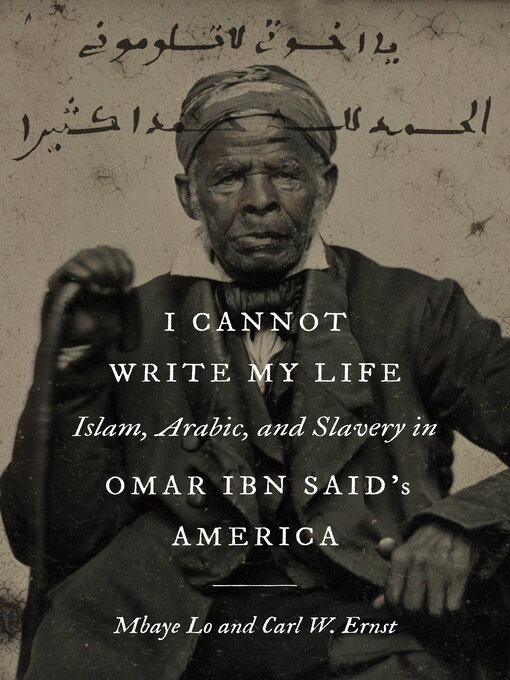I Cannot Write My Life
Islam, Arabic, and Slavery in Omar ibn Said's America
Mbaye Lo and Carl W. Ernst here weave fresh and accurate translations of Omar's eighteen surviving writings, for the first time identifying his quotations from Islamic theological texts, correcting many distortions, and providing the fullest possible account of his life and significance. Placing Omar at the center of a broader network of the era's literary and religious thought, Lo and Ernst restore Omar's voice, his sophisticated engagement with Islamic and Christian theologies, his Arabic skills, and his extraordinary efforts to express himself and exert agency despite his enslavement.
-
Creators
-
Series
-
Publisher
-
Release date
August 10, 2023 -
Formats
-
Kindle Book
-
OverDrive Read
- ISBN: 9781469674698
-
EPUB ebook
- ISBN: 9781469674698
- File size: 3834 KB
-
-
Languages
- English
-
Reviews
-
Publisher's Weekly
June 26, 2023
Lo (Muslims in America), an associate professor of Asian and Middle Eastern Studies at Duke University, and Ernst (Sufism), professor emeritus of Islamic Studies at the University of North Carolina, deliver an excellent study of enslaved scholar Omar ibn Said (1770–1863). Captured in 1807 West Africa and held in the U.S. for 50 years, Said was something of a curiosity for his enslavers—the Owenses, a prominent North Carolina family—because he could write in Arabic. Lo and Ernst draw on 18 surviving documents Said authored to explore afresh his life and legacy, which have been manipulated by “early amateur scholars, missionaries, and Arabists” who mistranslated his writing, and “zealous proslavery clergymen” who framed him as proof of a “benevolent slavery,” partly by claiming a voluntary conversion from Islam to Christianity (those sources fail to note that Said recites Qur’anic blessings in documents dated as late as 26 years after his supposed conversion). Early chapters fill in Said’s life in Africa, including 25 years spent studying at an Islamic seminary; later ones focus on Said’s 1831 “Autobiography.” Drawing on scrupulous close readings of Said’s work, Lo and Ernst make a worthy contribution to the scholarship on slavery in America and testify to the importance of evidence left behind by enslaved people themselves. This edifies.
-
Formats
- Kindle Book
- OverDrive Read
- EPUB ebook
Languages
- English
Loading
Why is availability limited?
×Availability can change throughout the month based on the library's budget. You can still place a hold on the title, and your hold will be automatically filled as soon as the title is available again.
The Kindle Book format for this title is not supported on:
×Read-along ebook
×The OverDrive Read format of this ebook has professional narration that plays while you read in your browser. Learn more here.

